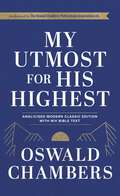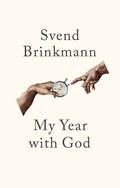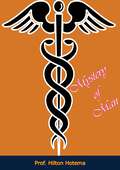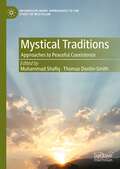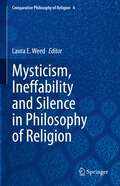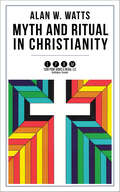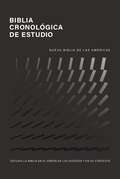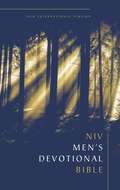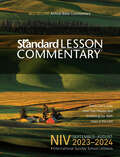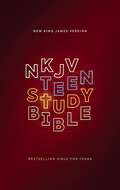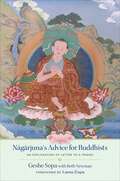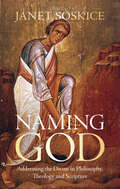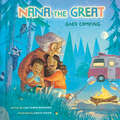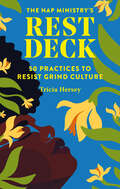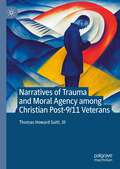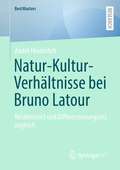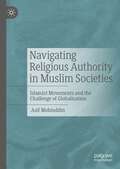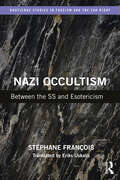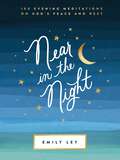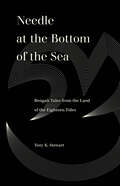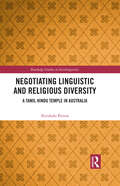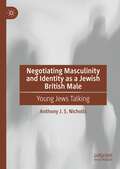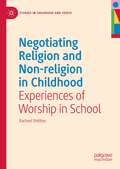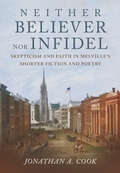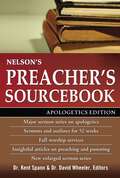- Table View
- List View
My Utmost For His Highest: Anglicised Modern Classic Edition with NIV Bible Text
by Oswald ChambersA modern classic to inspire your faithThe timeless wisdom of Oswald Chambers shines in this Modern Classic Edition which now includes Bible text from the New Internation Version (NIV). This Anglicised edition has taken a thoughtful approach to the language and context of the original, with the author's voice carefully preserved to speak with clarity and encouragement today.With a Bible passage and short thought for each day of the year, My Utmost for His Highest opens the way to a deeper, stronger faith in God.Oswald Chambers (1874 -1917) was born in Scotland and had a teaching and preaching ministry that took him as far as the United States and Japan. He died at age 43 while serving as a chaplain to the Allied troops in Egypt during World War One. His classic devotional has been a lasting legacy for millions of Christians around the world.
My Year with God
by Svend BrinkmannHow are Christians capable of believing? Is it faith or delusion? Or is there something wrong with me? I do not believe in spirits, gods, miracles, resurrection or eternal life. But I will seek to cast off my prejudices and give God a chance. At least for a year. Danish writer Svend Brinkmann spent a year with God, exploring faith and religion through the eyes of a sceptic. Each month, from January to December, he grappled with questions that had nagged at him since he was a child: Why does God let the innocent suffer? Does science disprove the existence of God? Does faith make you a better person? Can you doubt and still believe? It became a year of deep reflection and surprising revelations that challenged the bounds of his scientific worldview and led him to a new appreciation of faith and its place within a secular, mostly fulfilled life.
Mystery of Man
by Hilton HotemaIn this book, first published in 1956, Professor Hilton Hotema provides his insights into the ongoing mysteries of Man, his nature, evolution and ultimate place in the cosmos.Hilton Hotema is the author of numerous books on dietetics, fasting, fruitarianism, breatharianism, vitality, cellular regeneration, longevity, higher consciousness, spirituality, alternative medicine and ancient wisdom.
Mystical Traditions: Approaches to Peaceful Coexistence (Interdisciplinary Approaches to the Study of Mysticism)
by Muhammad Shafiq Thomas Donlin-SmithThis book discusses mysticism and its possible contributions to a positive common human future. It is organized into three parts - “Studies of Mystical Traditions,” “Comparative Studies of Mystical Traditions,” and “Social and Ethical Implications." The approach is philosophical and critical. The contributors differ on whether or not mystical traditions would restore peaceful living and peaceful coexistence. However, the problem before this manuscript is the growing pain and suffering caused by greed in the world, greed causing economic disequilibrium, racism and divisiveness causing social unrest resulting in mass migration and refugees’ crisis. Through the lens of “mystical traditions," the manuscript proposes a balance approach between material and spiritual needs of people. To strengthen human spiritualty, the manuscript emphasizes practicing meditation, music, prayers, zikr, yoga, mindfulness, fasting and other methods of spiritual revival for peace within self and with others.
Mysticism, Ineffability and Silence in Philosophy of Religion (Comparative Philosophy of Religion #4)
by Laura E. WeedThe authors in this volume explore a wide variety of the contemporary approaches to mystical and religious experience to elucidate what religious experience is, in its own terms, and how its practitioners understand it. This anthology features contributions that point out that contemporary studies of consciousness, sociology, hermeneutics, neuroscience, medicine, and other fields, are revealing that there is much more to be said for the inner life of a human’s consciousness than reductionists and behaviorists will allow.This book is one of very few that primarily takes the stance of academic practitioners, explaining their own experience, rather than that of academics trying to explain the phenomena away, as really politics, or sociology, or delusion, or psychological pathology, or literary flights of fancy, or an aberration of any of the other academic fields. Most of the authors in this volume embrace the task of explaining and analyzing religious experience, mysticism, and the healing power of silence and presence, using the resources of all of the academic disciplines, as appropriate. The essays contained analyze religious, and non-religious, mystical and profoundly personal experiences across several world religions, and in areas such as art and music, as well as in solving personal crises such as family disruption and patriarchal oppression. The authors address the subject matter through analyses of the frequent and destructive failures of language, or just noise, to capture or express the nuances of the inner life of a person. It is this very ineffability of self that renders the spiritual, emotional and interior life of individuals beyond cognition and perception, of the straightforward sorts embraced by most cognitive disciplines. The contributors come from a variety of cross-disciplinary fields to bring forth the possibilities for an intuitive and creative, rich and growing inner life for a human. This text appeals to students, researchers, and practitioners.
Myth and Ritual in Christianity
by Alan WattsA penetrating and wide-ranging study of mythological processes and their particular manifestation in Christian religion, Alan Watt's Myth and Ritual in Christianity is widely considered a classic. Using the lens of the "doctrine of mystical tradition", Watts explores the development of church doctrine in relation to the procession of seasons and finds, contrary to many contemporary critics, that Christianity cultivates virtue and promotes living in the now.
NBLA, Biblia Cronológica de Estudio, Interior a Cuatro Colores
by NBLA-Nueva Biblia de Las Américas VidaDisfruta de un viaje a través de la historia y la cultura con la única Biblia de estudio que se desarrolla en orden histórico, publicada en la traducción más literal en español, la Nueva Biblia de las Américas.La Biblia de Estudio Cronológica NBLA presenta las Escrituras en orden cronológico, en el orden en que ocurrieron los acontecimientos, con notas, artículos y gráficos a todo color que conectan al lector con la historia y la cultura de los tiempos bíblicos. Empezando por la creación y pasando por el pueblo de Dios en el Antiguo Testamento, la vida de Jesús y el nacimiento de la iglesia, esta Biblia proporciona una imagen vívida de la obra de Dios a lo largo de la historia. Perfecta para los lectores, independientemente de dónde se encuentren en su camino de fe, la Biblia de Estudio Cronológica es un gran recurso de estudio no sólo para comprender mejor el texto, sino también para ayudarle a experimentar esos momentos de una manera nueva y fresca.El texto completo de la NBLA con notas de los traductores y ordenado cronológicamente que proporciona un estudio bíblico cautivador y eficazLas ilustraciones a todo color de lugares, artefactos y fenómenos culturales ofrecen al lector una experiencia dramática de sentir "estar allí".Artículos fascinantes que conectan el texto bíblico con la historia y la cultura del mundoLas notas de la vida cotidiana le ayudan a relacionarse con la vida de la gente en los tiempos bíblicosLíneas cronológicas y los gráficos muestran el flujo de la historia bíblicaLos mapas en color del mundo bíblico que aparecen en el texto aportan una representación visual de Israel y otros lugares bíblicos para mejorar el contextoLetra de fácil lectura de 9 puntos NBLA Comfort Print ®NBLA, Chronological Study Bible, Hardcover, 4 Color InteriorThe NBLA Chronological Study Bible presents Scripture in chronological order—the order in which the events happened—with notes, articles, and full-color graphics that connect the reader to the history and culture of biblical times. Starting with creation and moving through God&’s people in the Old Testament, the life of Jesus and the birth of the church, this Bible provides a vivid picture of God&’s work throughout history. Perfect for readers regardless of where they are in their faith journey, the Chronological Study Bible is a great study resource to not only better understand the text but to also help you experience those moments in fresh, new ways.The entire NBLA text with translators&’ notes, arranged in chronological order, provides absorbing and effective Bible studyFull-color illustrations of places, artifacts, and cultural phenomena give the reader a dramatic, &“you are there&” experienceFascinating articles connect the Bible text to world history and cultureDaily Life Notes help you relate to how people lived in Bible timesTime Panels and Charts show the flow of Bible historyIn-text and full-page color maps of the biblical world provide a visual representation of Israel and other biblical locations for better contextEasy-to-read 9-point NBLA Comfort Print ®
NIV, Men's Devotional Bible
by ZondervanA year's worth of devotions written by men, specifically for men Apply God's Word to your life with a full year's worth of devotions written by men, for men, along with application statements, questions for reflection, and more. The NIV Men's Devotional Bible offers encouragement from contemporary and classic communicators and authors including Lee Strobel, Chuck Colson, and Rick Warren. Together, they will help you on your walk with God by presenting weekday and weekend devotions that are engaging, practical, and useful for your life today.The NIV Men's Devotional Bible is now available in the exclusive Zondervan NIV Comfort Print® typeface for smooth reading. Expertly designed specifically to be used for the New International Version (NIV) text, Comfort Print offers an easier reading experience that complements the most widely read modern-English Bible translation.Features:Complete text of the accurate, readable, and clear New International Version (NIV)260 weekday devotions and 52 weekend devotions, along with application statements, questions for reflection, and moreContributions from Chuck Colson, Lee Strobel, Rick Warren, and othersFull year reading plan to make time in God&’s Word a habitIntroductions for each book of the BibleAuthor index with biographical information on each contributorSubject index to help you locate topics easilyFresh, two-color page designDouble-column format
NIV® Standard Lesson Commentary® 2023-2024 (Standard Lesson Comm)
by Standard PublishingAs the world&’s most popular annual Bible commentary for more than three decades, Standard Lesson Commentary (SLC) provides 52 weeks of study in a single volume and combines thorough Bible study with relevant examples and questions. Key features include:Verse-by-verse explanation of the Bible textDetailed lesson contextPronunciation guide for difficult wordsPrinted ScriptureDiscussion startersA review quiz for each quarter Available in the King James Version (KJV) and New International Version® (NIV) Bible translations, the SLC is based on the popular Uniform Series. This series, developed by scholars from numerous church fellowships, outlines an in-depth study of the Bible over a multi-year period. The four main themes of the 2023–2024 study are:God&’s Law Is Love—Luke, John, Acts, Romans, 1 Corinthians, Galatians, ColossiansFaith That Pleases God—Ruth, 1 Samuel, 2 Chronicles, Proverbs, Isaiah, Daniel, Habakkuk, Matthew, Luke, Romans, HebrewsExamining Our Faith—Matthew, Mark, Luke, Acts, Romans, 2 Corinthians, 1 Peter, JudeHope in the Lord—Acts, Romans, 2 Corinthians, Colossians, Hebrews, 1 Thessalonians, Titus, 1 John The SLC is perfect as the primary resource for an adult Sunday School class, for personal study, or as a supplemental resource for any curriculum that follows the ISSL/Uniform Series. Nearly two dozen ministers, teachers, and Christian education specialists contribute their expertise to SLC.
NKJV, Teen Study Bible
by ZondervanThe bestselling NKJV Teen Study Bible helps teens apply God&’s Word to the issues they face every day!Full of study features to help today's teen learn more about God, the Bible, and how God's Word relates to their lives, the NKJV Teen Study Bible will help them keep in step with all God has done, is doing, and will do in the world. Teens will discover the eternal truths of God's Word and how to apply them to the issues they face every day as they read biblical advice about dealing with everything from friends, family, and school to problems such as bullying and depression. As teens navigate their hectic and sometimes stressful lives, this study Bible will help them to deepen and understand their faith while reassuring them that God is always with them, and they are never alone.Features:Complete text of the New King James Version (NKJV)&“We Believe&” features unpack the Apostles&’ Creed to reveal the biblical foundation of faith&“Panorama&” features keep the big picture of each book of the Bible in viewTopical indexes help with in-depth Bible studyBook introductions provide an overview for each book of the BibleBiblical advice about friends, family, school, and other issuesImportant Bible verses to memorizeQ and As test your Bible knowledgeProfiles of people in the BibleTwo-color page design8-page full-color map section
Nagarjuna's Advice for Buddhists: Geshe Sopa's Explanation of Letter to a Friend
by Lhundub SopaA modern commentary by a beloved Tibetan teacher on a classical Indian Buddhist text and an introduction to Buddhism by one of the tradition&’s most famous authors. A teaching on how to live a Buddhist life in contemporary society.Letter to A Friend, by the great Indian philosopher Nagarjuna, is one of the best-known introductions to Buddhism in classical Indian Buddhist literature. In this warm and generous commentary, one of the twentieth century&’s most beloved teachers, Geshe Lhundup Sopa, shows how Nagarjuna&’s advice on how to follow Buddhist ethics while living fully in the world speaks just as clearly to us today as it did to the Indian king for whom it was composed. Nagarjuna maintained that all Buddhists can embody the full teachings of the Buddha. Therefore, this book covers topics from simple virtues to the most profound truths of emptiness. Expertly compiled by his student, scholar Beth Newman, from talks given over a number of years, the commentary brings this ancient Buddhist teaching to a modern audience.
Naming God: Addressing the Divine in Philosophy, Theology and Scripture
by Janet SoskiceGenerations of Christians, Janet Soskice demonstrates, once knew God and Christ by hundreds of remarkable names. These included the appellations 'Messiah', 'Emmanuel', 'Alpha', 'Omega', 'Eternal', 'All-Powerful', 'Lamb', 'Lion', 'Goat', 'One', 'Word', 'Serpent' and 'Bridegroom'. In her much-anticipated new book, Soskice argues that contemporary understandings of divinity could be transformed by a return to a venerable analogical tradition of divine naming. These ancient titles – drawn from scripture – were chanted and sung, crafted and invoked (in polyphony and plainsong) as they were woven into the worship of the faithful. However, during the sixteenth century Descartes moved from 'naming' to 'defining' God via a series of metaphysical attributes. This made God a thing among things: a being amongst beings. For the author, reclaiming divine naming is not only overdue. It can also re-energize the relationship between philosophy and religious tradition. This path-breaking book shows just how rich and revolutionary such reclamation might be.
Nana the Great Goes Camping
by Lisa Tawn BergrenThis tender, spunky picture book from the bestselling author of the God Gave Us series celebrates the ways loving grandparents help children find new adventures—and timeless wisdom—around every corner.Summer vacations are great—and they&’re even better when they include camping with Nana! Nana is great at hiking, campfire cooking, and making new friends. She encourages slowing down to enjoy nature&’s wonders, learning new skills, and watching out for the discoveries that await outside everyday routines. Most of all, Nana is great at making treasured memories that will last a lifetime.
Nap Ministry's Rest Deck: 50 Practices to Resist Grind Culture
by Tricia Hersey"This is about more than naps. Rest is anything that allows you to connect your body with your mind."The Nap Ministry's Rest Deck is a rousing call to reclaim rest in everyday life. Delivered in a stunning package with gold accents and gorgeous artwork throughout, the deck combines restorative meditations with prescient wisdom from celebrated activist and teaching artist Tricia Hersey, a.k.a. "the Nap Bishop," and founder of the Nap Ministry.Readers will discover 50 inspiring cards, each with an empowering affirmation and a simple practice to encourage rest, rejuvenation, and imagination. Rooted in social justice and imbued with spirituality, these cards offer short, accessible practices designed to uplift anyone suffering from the toxic effects of grind culture.
Narratives of Trauma and Moral Agency among Christian Post-9/11 Veterans
by Thomas Howard Suitt, IIIServing in the military is often a disruptive event in the lives of those who join, precipitating a reassessment of the service member’s ethical sensibilities or, tragically, resulting in lasting moral injury and trauma. The military experience compels them to navigate multiple identities, from citizen to warrior and back. Their religious identity, sometimes rooted in a civilian religious community, can be altered by military participation. Through a series of inductive, in-depth qualitative interviews, Suitt explores how varied religious resources and potentially traumatic events affect the lives of post-9/11 veterans who once or currently identified as Christian. Adding to existing research on moral injury, it traces how military chaplains, ethics education, just war theory rhetoric, and formal religious practice supplied by the military alter the course of service members’ moral lives. These narrative trajectories reveal how veterans use Christian faith or other systems of meaning-making to understand war and their identities as service members and veterans.
Natur-Kultur-Verhältnisse bei Bruno Latour: Relation(en) und Differenzierung(en) zugleich (BestMasters)
by André HinderlichDas Verhältnis des Menschen zur Natur beschäftigt die Soziologie seit ihrem Entstehen und ist in Anbetracht der Klimakrise und anderer mit ihr netzwerkartig verbundener Problemlagen ein Thema von besonderer Aktualität. In der Spätmoderne vollzieht sich ein Bruch mit der dualistischen Auffassung von Natur versus Kultur, unter anderem im Denken des französischen Philosophen und Soziologen Bruno Latour, welcher als einer der Hauptvertreter der Science & Technology Studies (STS) gilt. André Hinderlich verfolgt mit der vorliegenden Publikation eine begriffliche Ordnung und theoretische Klärung der mannigfaltigen Ausführungen, Versatzstücke und Konzepte zur prominent gewordenen Akteur-Netzwerk-Theorie (ANT), mit Fokus auf dem Verhältnis der Begriffspaare 'Relation(en)' und 'Differenzierung(en)'. Dies führt notwendigerweise über Latour hinaus, zu ergänzenden naturphilosophischen Reflexionen sowie weiteren Methodologien innerhalb der Umweltsoziologie.
Navigating Religious Authority in Muslim Societies: Islamist Movements and the Challenge of Globalisation
by Asif MohiuddinGlobalisation stands as an indispensable lens through which to analyse current cultural, political, and social transformations. This prevailing paradigm, acknowledged by its advocates and critics, profoundly shapes our environment. Within this global landscape, Islam's position is noteworthy—often perceived as rejecting globalisation and its secular underpinnings. This book offers a perspective of the global resurgence of religion in general and the revival of Islam in particular as crucial features of globalisation. Furthermore, the book deeply explores how Islamist groups strategically challenge religious authority, utilising social media and the internet to reshape their spheres of influence. By exploring these dynamics, the book aims to provide comprehensive insights into the interplay between Islamist strategies, digital platforms, and religious institutions within our interconnected world.
Nazi Occultism: Between the SS and Esotericism (Routledge Studies in Fascism and the Far Right)
by Stéphane FrançoisNazi Occultism provides a serious scholarly study of a topic that is often marred by sensationalism and misinformation. The Morning of the Magicians by Pauwels and Bergier (1960) gave rise to the idea that a secret society with wide powers, the "Thule society", was the hidden and ignored centre of Nazism. The influence of this very real small group is, however, only a fantasy, a myth. The author, a historian specializing in neo-Nazism, looks back on this speculative construction, its origins, its ideological tinkering and the practices which have succeeded in forming a sort of radical and sulphurous counterculture which has created a fascination with esotericism and Nazism and the SS. To better understand it, he also paints a portrait of some of the authors who contributed to this extremist subculture, such as the Italian esotericist Julius Evola, the Argentine anthropologist Jacques-Marie de Mahieu, Chilean neo-Nazi Miguel Serrano, and the writer Jean-Paul Bourre. This book will appeal to scholars, researchers and activists as well as general readers with an interest in the history of Nazism and the occult.
Near in the Night: 100 Evening Meditations on God’s Peace and Rest (A 100-Day Devotional)
by Emily LeyFind peace for your soul and a restful night's sleep with devotions to put your heart at ease.Why is it that when the lights go off our minds start racing? We stew over what we could have done differently that day. We think about details we're afraid we'll forget in the morning. And most of all, we worry. Small anxieties as well as huge fears come alive when we're exhausted and trying to sleep. This 100-day devotional will put your anxieties in their place and bring peace to your soul.In this encouraging evening devotional, bestselling author Emily Ley shares her own stories and struggles, invites you into contemplation, and brings you back to the unchanging comfort found in the Bible.Near in the Night includes practical ideas to make your evenings calmer along with pages for taking notes, making lists (so you can stop thinking about those to-dos!), and journaling your personal reflections. Each of the 100 devotions will help you:Turn off your worries and regrets at nightRemember God's goodness in an uncertain worldDevelop a grace-filled evening routine so you can sleep well and wake up refreshed for the day ahead This devotional is perfect for:Anyone looking for uplifting biblical readings for those stress-filled evening hoursFans of Emily and her Simplified brandChristmas, New Year's, Mother's Day, birthdays, and graduation Pairing biblical wisdom with Emily's simplicity expertise, Near in the Night reminds you that God is always faithful and ever near, even in the darkest of nights.Look for Emily's companion 100-day morning devotional, Sure as the Sunrise.
Needle at the Bottom of the Sea: Bengali Tales from the Land of the Eighteen Tides (World Literature In Translation Ser.)
by Tony K. StewartThese enchanting stories from early modern Bengal reveal how Hindu and Muslim traditions converged on timeless themes of human morality, social culture, and survival. The Bengali stories in this collection are first and foremost tales of survival. Each story in Needle at the Bottom of the Sea underscores the need for people to work together—not just to overcome the challenges of living in the Sundarban swamps of Bengal, but also to ease hostilities born of social differences in religion, caste, and economic class. Translated by award-winning scholar of early modern Bengali literature Tony K. Stewart, Needle at the Bottom of the Sea brims with fantasy and excitement. Sufi protagonists travel through a world of wonder where tigers talk and men magically grow into giants, a Hindu princess falls in love with a Muslim holy man, and goddesses rub shoulders with kings and merchants. Across religion, class, and gender, what binds these fabulous stories together is the characters’ pursuit of living honorably and morally in a difficult, corrupt world.
Negotiating Linguistic and Religious Diversity: A Tamil Hindu Temple in Australia (Routledge Studies in Sociolinguistics)
by Nirukshi PereraDiversity is a buzzword of our times and yet the extent of religious diversity in Western societies is generally misconceived. This ground-breaking research draws attention to the journey of one migrant religious institution in an era of religious superdiversity. Based on a sociolinguistic ethnography in a Tamil Saivite temple in Australia, the book explores the challenges for the institution in maintaining its linguistic and cultural identity in a new context. The temple is faced with catering for devotees of diverse ethnicities, languages, and religious interpretations; not to mention divergent views between different generations of migrants who share ethnicity and language. At the same time, core members of the temple seek to continue religious and cultural practices according to the traditions of their homelands in Sri Lanka, a country where their identity and language has been under threat. The study offers a rich picture of changing language practices in a diasporic religious institution. Perera inspects language ideology considerations in the design of institutional language policy and how such policy manifests in language use in the temple spaces. This includes the temple’s Sunday school where heritage language and religion interplay in second-generation migrant adolescents’ identifications and discourse.
Negotiating Masculinity and Identity as a Jewish British Male: Young Jews Talking
by Anthony J. NichollsIn this book, Dr. Anthony Nicholls uses a series of in-depth interviews to investigate how young Jews talk about their Jewishness, Britishness, and masculinity. From his analysis, he argues that Jewishness is constructed between adherence to halachic requirement on one hand, and Jewishness experienced as cultural affinity to history, family, and tradition without recourse to halacha on the other hand. He further argues that Britishness is experienced between varying degrees of nationalistic localism against cosmopolitan liberalism played out against a backdrop of Britain contrasted with the rest of the world, and also London against the rest of Britain. Nicholls rejects the view that masculinity is constructed in the inherently unstable terms of physicality against intellectualism. Instead, he argues that it is better considered as lying in a range between competitive hegemonic masculinity and a cooperative model with which physicality and intellectualism combine to produce a more stable and emotionally satisfying mode of living.
Negotiating Religion and Non-religion in Childhood: Experiences of Worship in School (Studies in Childhood and Youth)
by Rachael ShillitoeThis book explores how and if the mandate for children to worship in schools can be justified within the context of declining church attendance and increasing nonreligious identification in British society. Shillitoe asks what place compulsory worship has in an increasingly diverse and plural society, and what the answer means for the relationship between religion, the secular, and education more broadly. Through in-depth ethnographic fieldwork from across three schools in southwest England, the book reveals how examining the significance of children’s experiences expands our understanding of both collective worship in schooling and religion in social life more broadly and demonstrates that adult-centric anxieties and assumptions in this area do not always reflect the experiences of children.
Neither Believer nor Infidel: Skepticism and Faith in Melville's Shorter Fiction and Poetry
by Jonathan A. CookShedding new light on both classic and lesser-known works in the Melville canon with particular attention to the author's literary use of the Bible, Neither Believer Nor Infidel examines the debate between religious skepticism and Christian faith that infused Herman Melville's writings following Moby-Dick. Jonathan A. Cook's study is the first to focus on the decisive role of faith and doubt in Melville's writings following his mid-career turn to shorter fiction, and still later to poetry, as a result of the commercial failures of Moby-Dick and Pierre. Nathaniel Hawthorne claimed that Melville "can neither believe nor be comfortable in his unbelief," a remark that encapsulates an essential truth about Melville's attitude to Christianity. Like many of his Victorian contemporaries, Melville spent his literary career poised between an intellectual rejection of Christian dogma and an emotional attachment to the consolations of non-dogmatic Christian faith. Accompanying this ambivalence was a lifelong devotion to the text of the King James Bible as both moral sourcebook and literary template. Following a biographical overview of skeptical influences and manifestations in Melville's early life and career, Cook examines the evidence of religious doubt and belief in "Bartleby, the Scrivener," "Cock-a-Doodle-Doo!," "The Encantadas," Israel Potter, Battle-Pieces, Timoleon, and Billy Budd. Accessible for both the general reader and the scholar, Neither Believer Nor Infidel clarifies the ambiguities of Melville's pervasive use of religion in his fiction and poetry. In analyzing Melville's persistent oscillation between metaphysical rebellion and attenuated belief, Cook elucidates both well-known and under-appreciated works.
Nelson's Preacher's Sourcebook: Apologetics Edition
by Thomas NelsonPlan a full year of sermons with Nelson's Preacher's Sourcebook. Inspiration doesn't always have to come from the mountain top. God can just as easily use a resource like Nelson's Preacher's Sourcebook to give you fresh and new ideas for your sermons, small group meetings, and seasonal gatherings. With suggestions for creative outlines, scripture text, preaching techniques and historical notes, use this sourcebook as a jumping off point when talking to God about the message He wants you to deliver. This Apologetics Edition of Nelson's Preacher's Sourcebook has an emphasis on evangelism and includes a sermon series focusing on apologetics.Features include:Sermons, creative outlines, illustrations, and quotes for every Sunday of the yearSpecial articles focusing on evangelismWorship helps, including hymns, prayers, and Scripture textInspirational thoughts and preaching techniquesSermons of special occasions and holidaysSermons and register pages for weddings and funeralsWith Nelson's Preacher's Sourcebook, you'll have engaging content for every Sunday of the year that your congregation will not just listen to, but truly hear.
